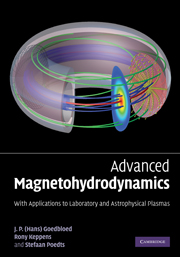15 - Computational linear MHD
Published online by Cambridge University Press: 05 March 2013
Summary
Computational magnetohydrodynamics is a very active research field due to the increasing demand for quantitative results for realistic magnetic configurations on the one hand and the availability of ever more computer power on the other [373]. Many MHD phenomena can not be described by analytical methods in all of their complexity although simplified analytical models have led to indispensable insight into the fundamental physics of various magnetohydrodynamic processes. The intricate geometry of present tokamaks, for instance, forces theory to resort to computer simulations as the mathematics is not fully tractable anymore. The fast increase of computer speed and memory allows simulations with ever more “physics” in the equations and taking into account the full 3D geometrical effects.
While the governing ideal MHD equations form a set of nonlinear, hyperbolic, partial differential equations, we already encountered many magneto-fluid phenomena which are adequately modeled by means of the linearized MHD equations. In this chapter, we concentrate mostly on computational approaches for linear MHD problems, and introduce several basic numerical concepts and techniques along the way. We give a brief overview of the most frequently encountered spatial discretizations to translate any problem expressed as a (set of) differential equation(s) into a discrete linear algebraic problem, and discuss commonly used strategies for solving the resulting linear systems and generalized eigenvalue problems. Representative applications cover MHD spectroscopic computations for diagnosing eigenoscillations and stability of given, possibly pre-computed, MHD equilibria, as well as steady-state and time dependent solutions to externally driven MHD configurations. Both ideal and non-ideal linear MHD problems are encountered.
- Type
- Chapter
- Information
- Advanced MagnetohydrodynamicsWith Applications to Laboratory and Astrophysical Plasmas, pp. 177 - 244Publisher: Cambridge University PressPrint publication year: 2010



